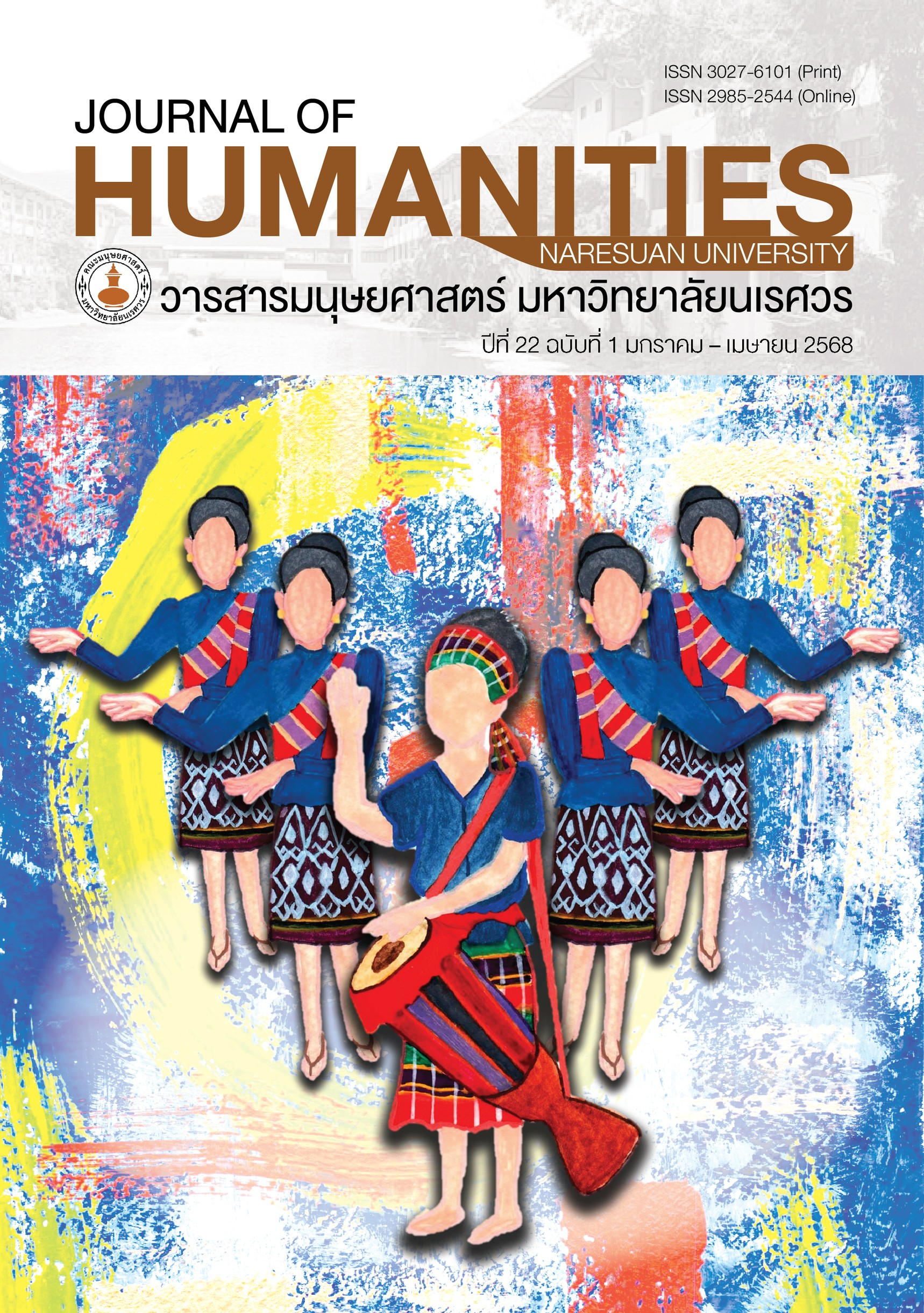ผลการฝึกฝนความสามารถด้านการใช้เหตุผลเชิงจริยธรรมผ่านมุมมองของผู้อื่นของนักศึกษามหาวิทยาลัยเทคโนโลยีพระจอมเกล้าธนบุรี
Main Article Content
บทคัดย่อ
บทความวิจัยนี้เป็นการวิจัยเชิงปริมาณ โดยมีวัตถุประสงค์เพื่อศึกษาความสามารถด้านการใช้เหตุผลเชิงจริยธรรมที่ผ่านมุมมองของผู้อื่นของนักศึกษามหาวิทยาลัยเทคโนโลยีพระจอมเกล้าธนบุรี เก็บข้อมูลกับนักศึกษาที่ลงทะเบียนเรียนรายวิชา GEN 111 มนุษย์กับหลักจริยศาสตร์เพื่อการดำเนินชีวิต ภาคการศึกษาปลาย ปีการศึกษา 2566 จำนวน 364 คน โดยวิธีการส่งลิงก์แบบทดสอบให้นักศึกษาประเมินตนเองผ่านระบบออนไลน์ วิเคราะห์ข้อมูลด้วยโปรแกรม Jamovi โดยใช้สถิติ t-test และนำข้อมูลสถิติมาวิเคราะห์เชิงพรรณนา
ผลการวิจัยพบว่า 1) นักศึกษาที่ลงทะเบียนรายวิชา GEN 111 มนุษย์กับหลักจริยศาสตร์เพื่อการดำเนินชีวิต ภาคปลาย ปีการศึกษา 2566 หลังจากจบการเรียนรู้ในหัวข้อการตัดสินใจเชิงจริยธรรมผ่านมุมมองของผู้อื่นและได้ทำแบบทดสอบ กลุ่มตัวอย่างมีค่าเฉลี่ยคำตอบของการคำนึงถึงผู้อื่นอยู่ในระดับ “มาก” ทั้งผู้ที่ตอบทางเลือกสนับสนุนและไม่สนับสนุนทางเลือกตัดสินใจในแบบทดสอบสถานการณ์สมมติ 2) นักศึกษาสามารถแยกแยะระดับความเห็นอกเห็นใจผู้อื่นในการสนับสนุนการตัดสินใจเชิงจริยธรรมได้สอดคล้องกับข้อคำถามที่ผู้วิจัยได้ออกแบบเอาไว้ทุกข้อ
Article Details

อนุญาตภายใต้เงื่อนไข Creative Commons Attribution-NonCommercial-NoDerivatives 4.0 International License.
ข้อความรู้ใด ๆ ตลอดจนข้อคิดเห็นใด ๆ เป็นของผู้เขียนแต่ละท่านโดยเฉพาะ คณะมนุษยศาสตร์ มหาวิทยาลัยนเรศวร และกองบรรณาธิการวารสารมนุษยศาสตร์ฯ ไม่จำเป็นต้องเห็นพ้องด้วย
เอกสารอ้างอิง
Bartels, D. M., Bauman, C. W., Cushman, F. A., Pizarro, D. A., & McGraw, A. P. (2015). Moral judgment and decision making. In G. Keren & G. Wu (Eds.), The Wiley Blackwell handbook of judgment and decision making (pp. 478-515). Wiley-Blackwell. https://doi.org/10.1002/9781118468333.ch17
Batson, C. D., Duncan, B. D., Ackerman, P., Buckley, T., & Birch, K. (1981). Is empathic emotion a source of altruistic motivation? Journal of Personality and Social Psychology, 40(2), 290-302. https://doi.org/10.1037/0022-3514.40.2.290
Chanpetch, S., & Fuakong, T. (2022). The moral reasoning: A case study of the first-year students at Prince of Songkla University Trang Campus. Sisaket Rajabhat University Journal, 16(3), 28-43. https://so05.tci-thaijo.org/index.php/sskrujournal/article/view/255971
Galang, C. M., Johnson, D., & Obhi, S. S. (2021). Exploring the relationship between empathy, self-construal style, and self-reported social distancing tendencies during the COVID-19 pandemic. Frontiers in Psychology, 12. https://doi.org/10.3389/fpsyg.2021.588934
García-Moriyón, F., González-Lamas, J., Botella, J., González Vela, J., Miranda-Alonso, T., Palacios, A., & Robles-Loro, R. (2020). Research in moral education: The contribution of P4C to the moral growth of students. Education Sciences, 10(4), 119. https://doi.org/10.3390/educsci10040119
Hoffman, M. L. (2000). Empathy and moral development: Implications for caring and justice. Cambridge University Press. https://doi.org/10.1017/CBO9780511805851
Juujärvi, S., & Myyry, L. (2022). Online dilemma discussions as a method of enhancing moral reasoning among health and social care graduate students. International Journal of Ethics Education, 7, 271-287. https://doi.org/10.1007/s40889-022-00143-9
Kohlberg, L. (1963). The development of children’s orientations toward a moral order: I. sequence in the development of moral thought. Vita Humana, 6(1-2), 11-33. https://doi.org/10.1159/000269667
Kohlberg, L. (1981). The psychology of moral development. Harper & Row.
Lamm, C., Batson, C. D., & Decety, J. (2007). The neural substrate of human empathy: Effects of perspective-taking and cognitive appraisal. Journal of Cognitive Neuroscience, 19(1), 42-58. https://doi.org/10.1162/jocn.2007.19.1.42
Plunkett, W. R., & Attner, R. F. (1994). Introduction to management. Wadsworth.
Pohling, R., Bzdok, D., Eigenstetter, M., Stumpf, S., & Strobel, A. (2015). What is ethical competence? The role of empathy, personal values, and the five-factor model of personality in ethical decision-making. Journal of Business Ethics, 137(3), 449-474. https://doi.org/10.1007/s10551-015-2569-5
Scholl, J. A., Mederer, H. J., & Scholl, R. W. (2018). Leadership, ethics, and decision-making. In A. Farazmand (ed.), Global encyclopedia of public administration, public policy, and governance (pp. 3687-3696). Springer. https://doi.org/10.1007/978-3-319-20928-9_2407
Simon, A. H. (1960). The new science of management decision. Harper & Row.


